|
|
|
Sort Order |
|
|
|
Items / Page
|
|
|
|
|
|
|
| Srl | Item |
| 1 |
ID:
160488
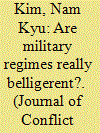

|
|
|
|
|
| Summary/Abstract |
Does military rule make a state more belligerent internationally? Several studies have recently established that military autocracies are more likely than civilian autocracies to deploy and use military force in pursuit of foreign policy objectives. I argue that military regimes are more likely to resort to military force because they are located in more hostile security environments, and not because they are inherently aggressive. First, I show that rule by military institution is more likely to emerge and exist in states facing external territorial threats. Second, by examining the relationship between military autocracies and conflict initiation, I find that once I control for states’ territorial threats, the statistical association between military regimes and conflict initiation disappears. Additionally, more evidence suggests that civilian dictatorships are more conflict-prone than their military counterparts when I account for unobserved dyad heterogeneity. The results are consistent across different measures of international conflict and authoritarian regimes.
|
|
|
|
|
|
|
|
|
|
|
|
|
|
|
|
| 2 |
ID:
160491
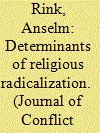

|
|
|
|
|
| Summary/Abstract |
A variety of theories attempt to explain why some individuals radicalize along religious lines. Few studies, however, have jointly put these diverse hypotheses under empirical scrutiny. Focusing on Muslim–Christian tensions in Kenya, we distill salient micro-, meso-, and macro-level hypotheses that try to account for the recent spike in religious radicalization. We use an empirical strategy that compares survey evidence from Christian and Muslim respondents with differing degrees of religious radicalization. We find no evidence that radicalization is predicted by macro-level political or economic grievances. Rather, radicalization is strongly associated with individual-level psychological trauma, including historically troubled social relations, and process-oriented factors, particularly religious identification and exposure to radical networks. The findings point to a model of radicalization as an individual-level process that is largely unaffected by macro-level influences. As such, radicalization is better understood in a relational, idea-driven framework as opposed to a macro-level structural approach.
|
|
|
|
|
|
|
|
|
|
|
|
|
|
|
|
| 3 |
ID:
160493
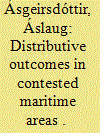

|
|
|
|
|
| Summary/Abstract |
Outside options can induce bargaining asymmetries that influence the outcome of international negotiations. This article focuses, however, on the impact of a regime-provided inside option on the willingness to cooperate and the distributive outcomes reached. Using a new data set covering 417 maritime boundaries, that fall under the Law of the Sea framework, this article shows that the ability to find agreement is closely linked to the distributional outcomes that states are able to realize. Different potential gains from cooperation result in bargaining asymmetries that influence both the ability to settle a maritime boundary and the distributive outcome reached when cooperation succeeds. Our evidence shows that the opportunity to invest in long-term projects that require legal certainty, such as offshore oil, facilitates cooperation and is associated with smaller distributional adjustments.
|
|
|
|
|
|
|
|
|
|
|
|
|
|
|
|
| 4 |
ID:
160494
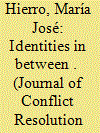

|
|
|
|
|
| Summary/Abstract |
This article examines how political conflict shapes ethnonational identities in contexts where a national group coexists with territorially concentrated ethnic minorities and qualifies the view that conflict polarizes identities. An often overlooked fact is that large numbers of citizens in these contexts identify simultaneously with both groups. Based on the research about cross-pressures, we claim that dual identifiers react differently to conflict than exclusive identifiers. We predict that political disputes harden and polarize identities, but only among citizens at the extremes. Heightened conflict should not alter the identity of dual identifiers, but lead them to withdraw from politics. The setting of our study is Catalonia, a territory with numerous dual identifiers and an intense nonviolent political conflict. Results from two survey experiments, qualitative interviews, and public opinion surveys confirm that heightened political conflict only produces polarization at the extremes, but dual identifiers do not exhibit this reaction. Our findings have implications for policy interventions, as they suggest that strengthening dual identities may assuage the polarizing effects of conflict.
|
|
|
|
|
|
|
|
|
|
|
|
|
|
|
|
| 5 |
ID:
160489
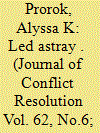

|
|
|
|
|
| Summary/Abstract |
This article examines the impact that rebel and state leaders have on civil war duration. It argues that leaders’ incentives to avoid punishment at the hands of internal audiences and opponents influence their strategic decision-making during war. Specifically, leaders who bear responsibility for involvement in the war have a higher expectation of punishment should they perform poorly, particularly for rebel and high-risk state leaders. As a result, these leaders have incentives to gamble for resurrection, extending ongoing wars in the hope of turning the tide and avoiding punishment. This suggests that civil wars are less likely to end when responsible leaders hold power, especially if the responsible leader is highly vulnerable to punishment. These propositions are tested using original data on all rebel and state leaders involved in civil conflicts between 1980 and 2011. Results support the hypothesized relationship between leader responsibility and war duration.
|
|
|
|
|
|
|
|
|
|
|
|
|
|
|
|
| 6 |
ID:
160492
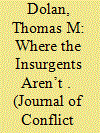

|
|
|
|
|
| Summary/Abstract |
Scholars often find that highlands and rural areas foster insurgencies. However, others have argued that cities can also be centers of insurgent activity and that nonterritorial insurgencies are different from territorial guerilla wars. We expect that in a nonterritorial insurgency, the high quality of local knowledge makes populated rural areas inhospitable to nonterritorial insurgent activity. Using data from a random sample of about 750 Médaille de la Résistance Française recipients, we find that departments with more residents in cities and large towns had more medal recipients than rural departments. Analyses of repression patterns (finding that insurgent arrests are less likely in cities than rural areas) and the historical record provide further evidence for the information mechanism.
|
|
|
|
|
|
|
|
|
|
|
|
|
|
|
|
| 7 |
ID:
160490
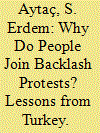

|
|
|
|
|
| Summary/Abstract |
When people learn that demonstrators are being subjected to harsh treatment by the police, sometimes their reaction is to join demonstrations. What explains the potentially mobilizing power of repression? Information-oriented theories posit that repression changes people’s beliefs about the likely success of the protests or the type of the government, thus encouraging them to join. Social–psychological theories posit that repression provokes a moral and emotional reaction from bystanders, and these emotional reactions are mobilizing. Our research offers a rare opportunity to test these theories, empirically, against one another. We offer experimental evidence from Turkey after the 2013 Gezi uprising. In this setting, emotional reactions appear to be the link between repression and backlash mobilization. Information-oriented theories of backlash mobilization may be less germane in democracies, in which people already have access to information about their governments, and in highly polarized polities, in which few people’s political affinities are up for grabs.
|
|
|
|
|
|
|
|
|
|
|
|
|
|
|
|
|
|
|
|
|